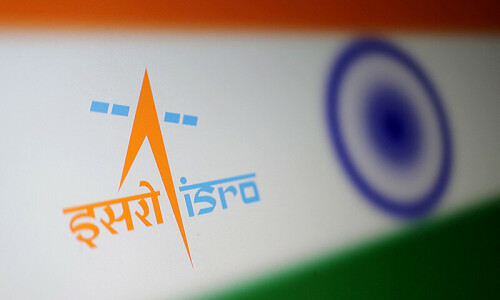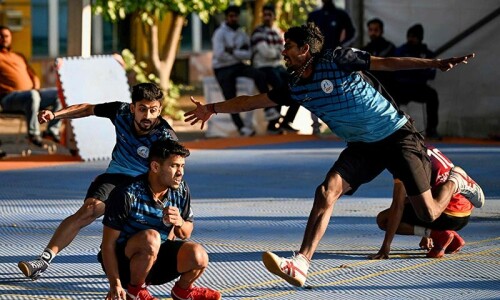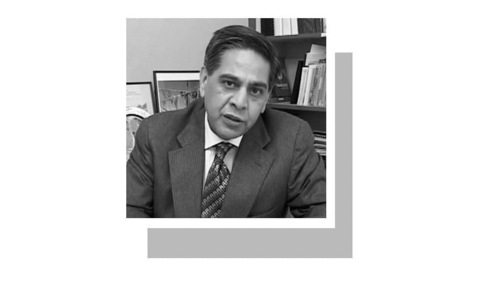One of the first things you notice about Tahir Hussain Faridi, formerly Geoffrey Lyons, is his massive dreadlocks. He ties them in a knot and then wraps them around his head, often covering it with a scarf for performances. When he opens them, they hit the ground well beyond his feet — after all, he’s been growing them for 20 years.
He’s the front man for a predominantly ‘white’ qawwal group called Fanna Fi Allah that recently toured in Pakistan. Tahir Hussain Faridi is no stranger to Pakistan, and he and his group have been coming here for the past 10 years.
“We attend the urs of Baba Farîd Ganjshakar in Pakpattan every year and the urs of Data Ganj Baksh in Lahore,” he related, “We do it pretty consistently and then also visit many dargahs for hazri, such as Baba Bulleh Shah’s dargah … to offer our respect to these great masters. We’ve visited most of the dargahs, at least of the Khwajagans (chain of Central Asian Naqshbandi Sufi Masters from the 10th-16th century) and their descendants all over Pakistan.”
“We love it,” he continued with a serene smile, “it’s our favourite thing. Definitely, the most fun is the urs of Baba Farîd because all of our favourite qawwals attend and we get to listen to them.
“Mostly what we do is simply hang out with our teachers, our ustads, and sleep on their floors, study with them all night and follow them to different programmes all over Pakistan. And then of course, we’re invited to perform as well.”
Faridi was drawn to the spirituality the East promised from a very young age. When only in his teens, this Canadian (born in Nova Scotia) left his homeland to become a sanyasi and live like a jogi or a dervaish in the Himalayas for many years. “I was always looking for a guru but never really found what I was looking for,” he related, “I had a lot of time to reflect on my spiritual practises and studied a lot of scriptures.”
And then at the tender age of 16, Faridi said he found his tasawwuf and his pir, Sheikh Leban (originally from Djibouti in the Horn of Africa), through whom Faridi took his shahadat into Islam. Sheikh Leban then christened him Tahir Hussain. “I felt I was a part of a spiritual community in Islam with eating together, doing zikr together and offering namaz together … all of these things made me feel like I was a part of something meaningful. It meant a lot to me.” What about the ‘Faridi’ in his name? “Because I’m a mureed of Baba Farîd Ganjshakar,” he responded.
“I had already been studying Indian classical music and I heard qawwali and enjoyed it and thought it would be a great as far as my spiritual connection was concerned,” he said talking about his introduction to the art form. In 2001 he formed Fanna Fi Allah with a bunch of like-minded individuals who shared his passion for qawwali.
Being a predominantly California-based act, who does he think is their audience? “We mostly perform for westerners in international music festivals,” he responded, “We do a lot of touring for Pakistani and Indian audiences that know about qawwali and understand some of the language.”
“It’s wonderful because Pakistani people are very kind and inviting and have a high level of hospitality,” he said about performing in Pakistan, “They’ve always loved our music even though we’re still babies and learning. They give us a lot of respect and know how to appreciate qawwali music.
“In the West, they don’t necessarily know how to interact with the music and the musician in the same way, but they appreciate the power of the music and the energy behind it, the devotion and sincerity, in their own way.”
Faridi has also been working on a documentary on qawwali music and is currently looking towards crowd-sourcing funds to get it professionally edited. “There has never been a complete documentary on qawwali that is available to the general public,” he said, “Also because we’ve been playing 10 years of music and deep inside the tradition of qawwali with their masters, dargahs, meeting pirs and dervaishes and inside mehfils … there is some amazing footage I’d like to share.”
As with every experience, especially spiritual ones, this too has had its own set of thorns. “Maybe five to three per cent of feedback that we get is from people who feel they can judge other people. They say things like ‘You shouldn’t have a woman in your group, this is wrong,’” related Faridi about the backlash his group sometimes gets.
Perhaps they’ve never heard of the likes of Abida Parveen or Sanam Marvi? “They probably have their judgements reserved towards them as well,” he responded, “they say things like ‘Music is forbidden in Islam, this is shirk, this isn’t Fanna Fi Allah, this is Fanna Fi Sheitaan etc. But it doesn’t faze us too much because everybody has got their opinion and is entitled to their way of life.
“But when it comes to judging other people’s spiritual paths, I think humans are too limited to have an overall opinion in judging that ‘this is wrong and this is right.’ I don’t believe in that personally.”
Since qawwali has always conventionally been a family tradition, does he plan to initiate a new one? “I’m still young!” he laughed, “I’m still focusing on learning mostly, even though I’ve been performing mostly on this tour.”
“The birth of my daughter was seven months ago,” he says with a smile, “her name is Aaliyah Zahida. She’s already interested in qawwali so I’m teaching her. My wife also sings. I don’t know if it’ll be a part of my family tradition. Inshallah, we’ll see.”


















































